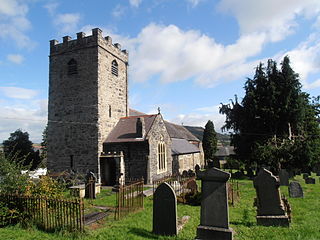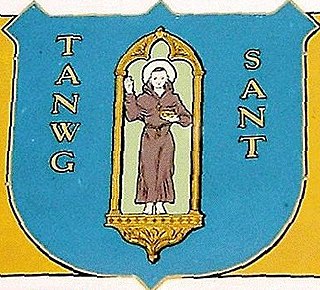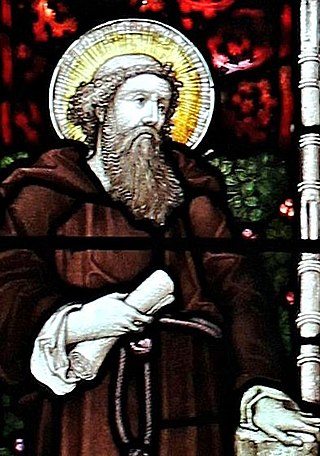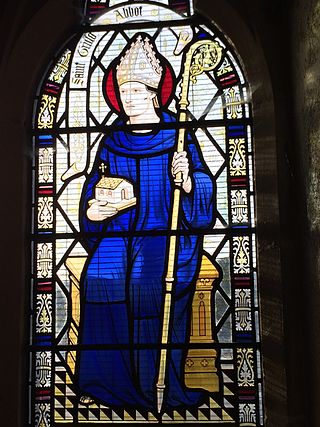Related Research Articles

Rhos-on-Sea is a seaside resort and community in Conwy County Borough, Wales. The population was 7,593 at the 2011 census. It adjoins Colwyn Bay and is named after the Welsh kingdom of Rhos established there in late Roman Britain as a sub-kingdom of Gwynedd. It later became a cantref (hundred).

Saint Mael and Saint Sulien's Church is a church located in the town of Corwen in Denbighshire in Wales. It was formerly located in the ancient county of Merionethshire.
Saint Baglan was a 6th-century hermit who lived at Baglan in Wales.

Maentwrog is a village and community in the Welsh county of Merionethshire, lying in the Vale of Ffestiniog just below Blaenau Ffestiniog, within the Snowdonia National Park. The River Dwyryd runs alongside the village. Its population of 585 in 2001 increased to 631 at the 2011 Census. The Community of Maentwrog includes the village of Gellilydan.
John Williams, was an antiquary and Anglican priest. Born in Llangynhafal, Denbighshire Wales in 1811, he graduated from Jesus College, Oxford in 1835 to become the Anglican curate of Llanfor, Merionethshire, where he married Elizabeth Lloyd Williams. In 1843 he became perpetual curate of Nercwys, Flintshire, and rector of Llanymawddwy, Merionethshire, in 1849.

Rhydderch Hael, Riderch I of Alt Clut, or Rhydderch of Strathclyde, was a ruler of Alt Clut, a Brittonic kingdom in the Hen Ogledd or "Old North" of Britain. He was one of the most famous kings in the Hen Ogledd, and appears frequently in later medieval works in Welsh and Latin.
Clydno Eidyn was a ruler of Eidyn, the district around modern Edinburgh, in the 6th century. Eidyn was a district of the Gododdin kingdom in the Hen Ogledd, or "Old North", the Brittonic-speaking parts of Northern England and southern Scotland in the Early Middle Ages. Clydno became a figure in Welsh tradition.

Saint Tanwg is the patron saint of Llandanwg, Gwynedd, Wales. He is presumed to be the founder of St Tanwg's Church, the small church at Llandanwg near Harlech, although the presence of an inscribed stone which has been dated to the 5th century suggests the church was already in existence when Tanwg and his brothers arrived in the area early in the 6th century. This Llandanwg Stone is inscribed with two names, one being Ingenui ; the other is indecipherable. The stone is not local. It is thought to have come from the Wicklow Hills in Ireland. This means that it was probably brought over by a rich person. It is a reasonable conjecture that Ingenuus may have been the founder of the church in the late fifth century, and that St. Tanwg lived at this llan a generation or two later. Another stone, called the Equester Stone, is of 6th century date. It is inscribed Equestrinomine, an unusual form of wording otherwise known only from 4th century inscriptions in Italy and Gaul.
Cadfan, was the 6th century founder-abbot of Tywyn and Bardsey, both in Gwynedd, Wales. He was said to have received the island of Bardsey from Einion Frenin, king of Llŷn, around 516 and to have served as its abbot until 542.

Saint Twrog's Church is in the village of Maentwrog in the Welsh county of Gwynedd, lying in the Vale of Ffestiniog, within the Snowdonia National Park. It is in the Deanery of Ardudwy. It is designated by Cadw as a Grade II listed building.

Saint Twrog - feast day 26 June - was a 6th-century Welsh saint who founded the church at Maentwrog, having come to Wales early in the Age of the Saints.

Saint Tegai is the patron saint and founder of Llandygai in the Welsh county of Gwynedd.

Saint Tecwyn is the patron saint and founder of Llandecwyn in the Welsh county of Gwynedd.

Saint Flewyn is the patron saint and founder of St Fflewin's Church, Llanfflewin, in Anglesey, Wales.

St Fflewin's Church, Llanfflewin is a small rural church, situated by a farm in Anglesey, Wales. The first church on the site is said to have been built by St Fflewin in 630, but the present building has no structural features dating from before the 18th century, although the church has a font from the 14th or 15th century and part of an inscribed medieval gravestone has been reused in a window sill.

Saint Gredifael is the patron saint and founder of St Gredifael's Church, Penmynydd, in Anglesey, Wales.

Saint Trillo is the patron saint and founder of the churches at Llandrillo, Denbighshire and Llandrillo yn Rhos, Rhos-on-Sea in Conwy County Borough, Wales.
Cyllin was a legendary, and possibly historical British king of the 1st century AD, early Christian saint and the last pendragon of Great Britain. His existence is based on very limited evidence. Richard Williams Morgan claimed that a reference to him as a son of Caratacus was found in the family records of Iestyn ab Gwrgant and used this as evidence of early entry of Christianity to Britain;
Cyllin ab Caradog, a wise and just king. In his days many of the Cymry embraced the faith in Christ through the teaching of the saints of Cor-Eurgain, and many godly men from the countries of Greece and Rome were in Cambria. He first of the Cymry gave infants names; for before, names were not given except to adults, and then from something characteristic in their bodies, minds, or manners.
Llechid was a 6th-century pre-congregational saint of Wales.
Hael or Haël may refer to:
References
- ↑ Enwogion Cymru: A Biographical Dictionary of Eminent Welshmen, from the Earliest Times to the Present, and Including Every Name Connected with the Ancient History of Wales By Robert Williams, Llandovery, 1852. p. 246.
- ↑ The Lives of the British Saints: The Saints of Wales, Cornwall and Irish Saints By S. Baring-Gould, John Fisher, Honourable Society of Cymmrodorion (London, England) Edition: illustrated Published by Kessinger Publishing, 2005, ISBN 0-7661-8767-5.